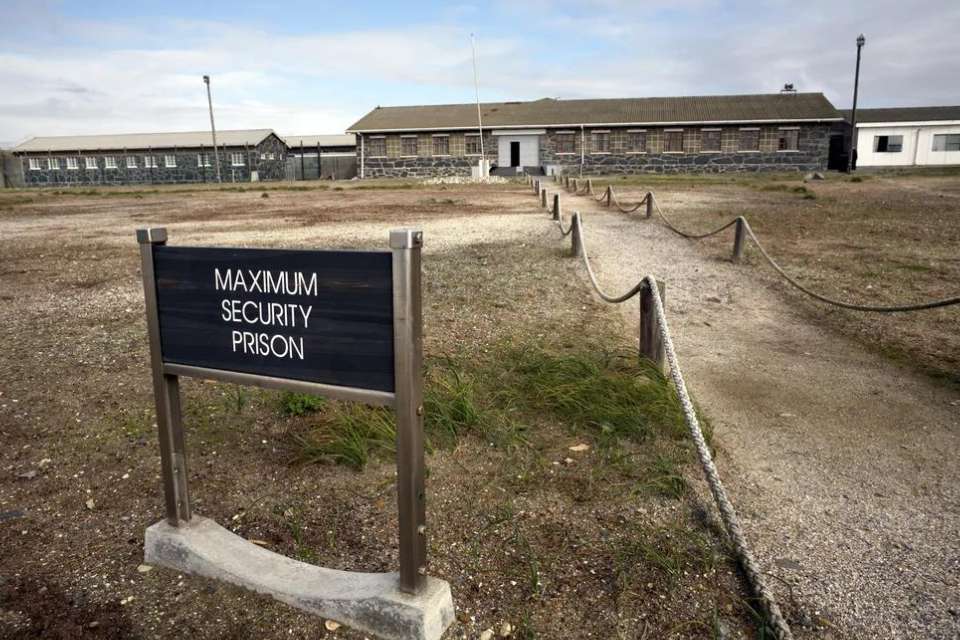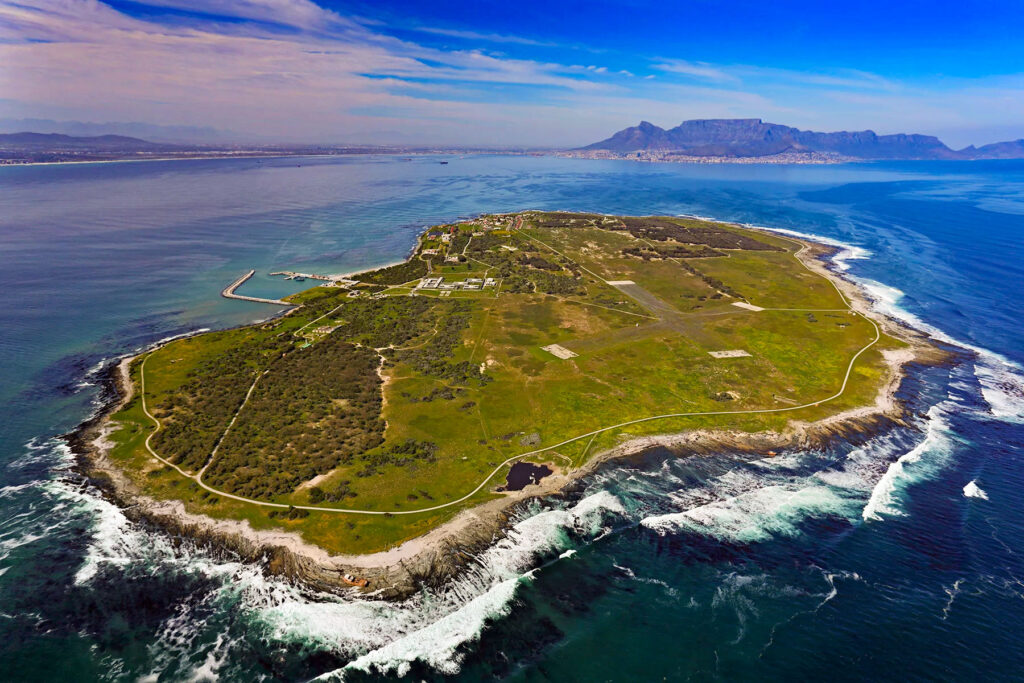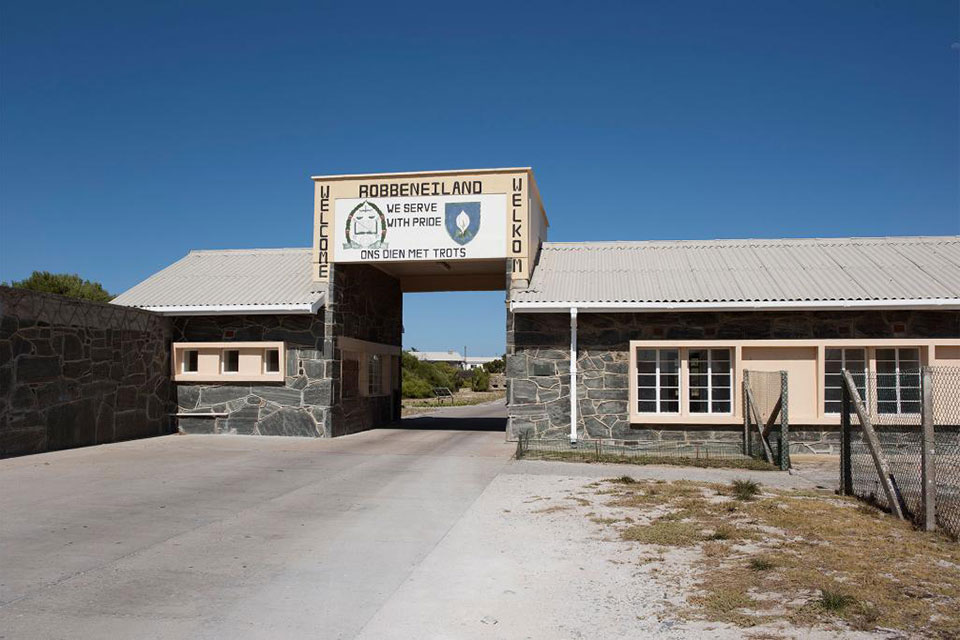Robben Island, located in Table Bay, 6.9 kilometers west of Bloubergstrand, was used as a prison from the late 17th century until 1996. It is a significant symbol of the triumph of the human spirit over adversity, suffering, and injustice.
The island has a rich 500-year-old history and is visited by thousands of people each year to understand and honor the important aspects of South Africa’s history that it represents. It is also the place where political activist and lawyer Nelson Mandela was imprisoned for 18 of the 27 years he served before the end of apartheid.
on Mandela’s incarceration Robben Island, his subsequent election as President of South Africa, and his advocacy for peace and social justice have left a lasting legacy.
Key Takeaways:
- Robben Island has a 500-year-old history and served as a prison until 1996.
- Nelson Mandela was imprisoned on Robben Island for 18 years.
- Robben Island represents the struggle against apartheid and the fight for freedom and equality in South Africa.
- Visiting Robben Island allows visitors to gain a deeper understanding of South Africa’s history and Nelson Mandela’s legacy.
- Mandela’s leadership and advocacy for peace continue to inspire people worldwide.
Explore the History of Robben Island

Robben Island holds centuries of rich history, serving as a place of isolation for various individuals since the 17th century. Notably, it became a prison for political prisoners, including the renowned Nelson Mandela, who spent 18 years incarcerated on the island.
The history of Robben Island is deeply intertwined with the struggle against apartheid and the fight for freedom and equality in South Africa. It stands as a testament to the resilience and determination of those who fought for justice during Mandela’s era.
Today, Robben Island stands as a living museum, skillfully managed by the Robben Island Museum. Through insightful tours and engaging exhibits, visitors can gain a deeper understanding of the island’s historical significance, shedding light on Mandela’s struggle and the broader context of South African history.
Embark on a journey through time at Robben Island, and immerse yourself in the stories that have shaped our nation’s past.
Experience a Guided Robben Island Tour

Taking a tour of Robben Island is an immersive and enlightening experience for those seeking to delve deeper into the rich history of South Africa and gain a profound understanding of Nelson Mandela’s inspiring legacy.
Departing from the Nelson Mandela Gateway at the vibrant V&A Waterfront in Cape Town, our guided tours offer an insightful journey that spans approximately 3.5 hours. It is an opportunity to step onto the same ground where freedom fighters paved the path to liberation and equality.
A Robben Island tour encompasses a ferry trip to and from the island, allowing you to witness the scenic beauty of Table Bay as you approach this iconic location. Upon arrival, knowledgeable guides, equipped with deep insights into the island’s history, will lead you on a captivating walking tour.
As you walk in the footsteps of those who fought for freedom, you will gain a profound appreciation for the sacrifices made during South Africa’s struggle for justice.
One of the highlights of the tour is the chance to witness the significance of Nelson Mandela’s cell, where he spent 18 years of his life as a political prisoner.
Stepping inside his confined space, you will be transported back in time, immersing yourself in the journey of one of the world’s most respected leaders. With each step, you will learn about his unwavering resolve and his unyielding commitment to a better, more inclusive future.
The guided Robben Island tour offers a unique opportunity to connect with the stories of bravery and resilience that shaped South Africa’s history.
By experiencing this tour, you are not only gaining insights into the life and struggle of Nelson Mandela, but you are also honoring the countless individuals who fought alongside him for a better tomorrow.
Join in on this remarkable journey and leave with a profound appreciation for the human spirit’s triumph over adversity.
Robben Island Museum: Preserving History

The Robben Island Museum is dedicated to the preservation of the rich history and heritage of Robben Island.
It is their mission is to honor the memory of those who were imprisoned on Robben Island and to educate visitors about the island’s significant role in the struggle against apartheid and the development of a democratic South Africa. They believe that by preserving and sharing the stories of the past, we can inspire a better future.
As a UNESCO World Heritage Site and a South African National Heritage Site, Robben Island holds immense historical and cultural value. It serves as a testament to the resilience and determination of those who fought for freedom and justice.
Explore the museum’s exhibits and artifacts, attend educational programs, and join the guided tours. Through these experiences, you will gain a deeper understanding of the island’s profound impact on South Africa’s history and the enduring legacy it holds.
Mandela’s Legacy: From Prisoner to President

Nelson Mandela’s time on Robben Island played a significant role in shaping his life and his fight against apartheid.
During his imprisonment, he became a symbol of resistance and resilience, and his leadership inspired millions of people around the world. After his release, Mandela went on to become the first black President of South Africa and played a pivotal role in the country’s transition to nonracial democracy.
Mandela’s legacy is one of peace, reconciliation, and the pursuit of equality. His story continues to inspire people to this day, as they learn about his unwavering dedication to justice and his unwavering belief in the power of unity.
Mandela’s journey reflects the indomitable spirit of the South African people and serves as a reminder that positive change is possible, even in the face of immense adversity.
Visitor Information for Robben Island
If you’re planning a trip to Robben Island, here’s some essential information you should know. Robben Island is open to visitors every day of the week, from Monday to Sunday, from 08:00 to 17:00. So, you have plenty of time to explore this historical site.
To get to Robben Island, you can take a ferry from the Nelson Mandela Gateway, conveniently located at the V&A Waterfront in Cape Town. The ferry trip itself is an exciting experience, and it takes about 30 minutes each way. The entire tour, including the ferry trip, lasts approximately 3.5 hours, giving you ample time to immerse yourself in the island’s history.
It is highly recommended to book your Robben Island tour in advance to secure your spot, as it can be a popular attraction, especially during peak seasons. You wouldn’t want to miss out on this incredible experience.
Robben Island is situated in Table Bay, a picturesque location off the coast of Cape Town. The museum’s address is Private Bag Robben Island, Cape Town 7400. Be sure to note down this address for any correspondence or inquiries you may have.
Conclusion
Exploring Robben Island and learning about Nelson Mandela’s history and legacy is a powerful and thought-provoking experience.
The island serves as a reminder of the triumph of the human spirit and the importance of fighting for justice and equality. When you visit Robben Island, you delve into South Africa’s history, understanding the impact that individuals like Nelson Mandela have had on shaping our country’s future.
Robben Island offers visitors a unique opportunity to gain a deeper understanding of South Africa’s past. Through immersive guided tours, you will walk in the footsteps of those who came before us in liberating our nation from apartheid.
You will witness firsthand the conditions Nelson Mandela endured during his 18 years of imprisonment, further appreciating his resilience and unwavering pursuit of freedom
As you explore the island’s museum and exhibits, we immerse ourselves in the rich history and legacy of Robben Island. You come face to face with a powerful narrative of struggle, resilience, and the fight for justice.
Robben Island leaves a lasting impression, inspiring us to stand up against injustice and advocate for a more equal society. It is a place of reflection and inspiration, igniting a renewed commitment to Mandela’s vision of peace, reconciliation, and the pursuit of equality.
FAQ
What is the history of Robben Island?
Robben Island has served as a prison since the late 17th century and played a significant role in the struggle against apartheid in South Africa. It is also the place where Nelson Mandela was imprisoned for 18 years.
Can I take a tour of Robben Island?
Yes, you can take a guided tour of Robben Island. The tour includes a ferry trip to and from the island, as well as a guided walking tour that allows visitors to learn about the island’s history and visit Nelson Mandela’s prison cell.
What is the role of the Robben Island Museum?
The Robben Island Museum is responsible for preserving the history and heritage of Robben Island. It manages the island as a living museum, offering educational programs, exhibitions, and guided tours.
What is Nelson Mandela’s legacy?
Nelson Mandela’s time on Robben Island played a significant role in shaping his life and his fight against apartheid. His legacy is one of peace, reconciliation, and the pursuit of equality.
When is Robben Island open to visitors?
Robben Island is open from Monday to Sunday, from 08:00 to 17:00.
Where is Robben Island located?
Robben Island is located in Table Bay, off the coast of Cape Town, South Africa.

